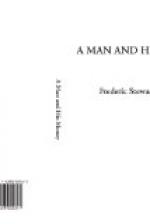CHAPTER VI
PLOT AND COUNTER-PLOT
Mr. Heatherbloom drifted; not “looking for a way”, one was forced upon him. It came to him unexpectedly; chance served him. He would have thrust it from him but could not. During his more or less eccentric peregrinations in Central Park he had formed visual acquaintances with sundry folk; pictures of some of them were very dimly impressed on his consciousness, others—and the major part—on his subconsciousness.
Flat faces, big faces, red faces, pale faces! One countenance in the last class made itself a trifle more insistent than the others. Its possessor had watched with interest his progress, interrupted with entanglements, and had listened to the music of his march, the canine fantasia, staccato, affettuoso! Mr. Heatherbloom’s halting footsteps in the park generally led him to the heights; it wasn’t a very high point, but it was the highest he could find, and he could look off on something—a lake, or reservoir of water, he didn’t know just which, and a jagged sky-line.
The person that exhibited casual curiosity in his movements and his coming thither was a woman. She seemed slight and sinuous, sitting there against the stone parapet, and deep dark eyes accentuated the pallor of her face. He did not think it strange she should always be at this spot when he came; in fact, it was quite a while before he noticed the almost daily coincidence of their mutual presence at the same place, at about the same time. After her first half-sly, half-sedulous regard of him, she would look away; her face then wore a soft and melancholy expression; she appeared very sad.
It took quite a while for this fact to be communicated to Mr. Heatherbloom. Though she shifted her figure often, as if to call attention to the pale profile of her face against a leaden sky, his thoughts remained introspective. Only the sky-line seemed to interest him. But one day something white came dancing in the breeze to his feet. Absorbed in deep neutral tones afar, he did not see it; his four-footed charges, however, were quick to perceive the object.
“Oh!” said the lady.
Mr. Heatherbloom looked. “Is—is it yours?” he asked.
“It—was,” she remarked with a slight accent on the last word.
He got up; there seemed little use endeavoring to rescue the handkerchief now.
“I’m afraid I’ve been rather slow,” he remarked. “Quite stupid, I’m sure.”
She may have had her own opinion but maintained a discreet silence. Mr. Heatherbloom stooped and gathered in the remnants. “You will permit me,” he observed, “to replace it, of course.”
“But it was not your fault.”
“It was that of my charges, then.”
“No; the wind. Let’s blame it on the wind.” She laughed, her dark eyes full on his, though Mr. Heatherbloom seemed hardly to see them.




